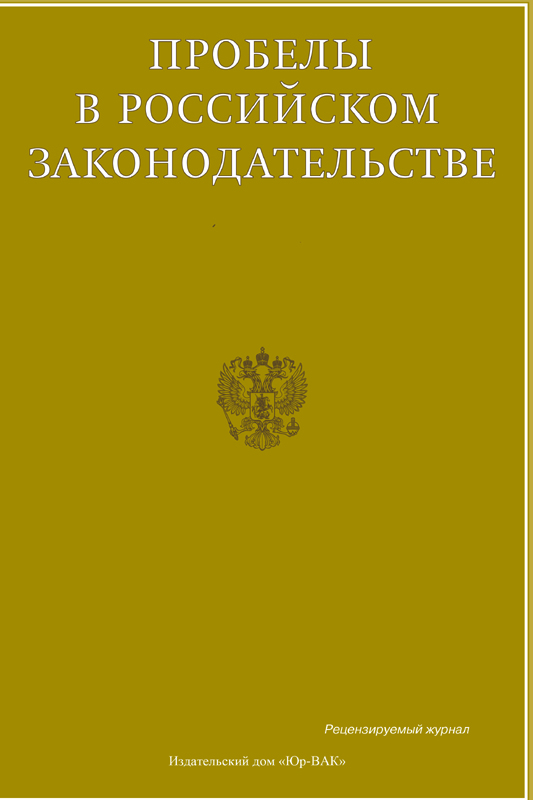Методологические аспекты разработки правовой модели устойчивого корпоративного управления: к постановке вопроса
- Авторы: Петрова А.В.1
-
Учреждения:
- Фонд поддержки социальных инициатив Газпрома
- Выпуск: Том 16, № 8 (2023)
- Страницы: 119-125
- Раздел: Частно-правовые (цивилистические) науки
- URL: https://journals.eco-vector.com/2072-3164/article/view/626423
- EDN: https://elibrary.ru/PXJPCA
- ID: 626423
Цитировать
Аннотация
Глобальный тренд реализации целей устойчивого развития и ESG-трансформации ставит сложную в методологическом плане задачу разработки национальной правовой модели устойчивого корпоративного управления. В статье рассмотрены: её необходимость и возможность, отечественная традиция правового моделирования, в том числе в сфере управления, проблема использования иностранного, прежде всего западного, опыта в современных условиях, стремление бизнеса к новациям в рассматриваемой сфере. Выделена ключевая методологическая проблема определения степени и адекватности вмешательства государства в корпоративные отношения: обоснования необходимости правовой регламентации устойчивого корпоративного управления, либо оставления его в сфере мягкого регулирования, сочтя это внутренним делом корпораций. Принимая во внимание особенности текущей ситуации, в которой экономика работает под давлением санкций и внешних обстоятельств, разработка искомой модели может представляться не актуальной и преждевременной. В этом контексте публикация ориентирована на постановку, актуализацию вопроса.
Полный текст
Об авторах
Алина Викторовна Петрова
Фонд поддержки социальных инициатив Газпрома
Автор, ответственный за переписку.
Email: petrova.av@socialfondgaz.ru
Заместитель генерального директора по правовым и имущественным отношениям
Россия, МоскваСписок литературы
- Барков А.В. О применении метода правового моделирования в цивилистических диссертациях // Методологические проблемы цивилистических исследований: Сб. науч. статей. Ежегодник. Вып. 2. 2017/ Отв. ред. А.В. Габов, В.Г. Голубцов, О.А. Кузнецова. М.: Статут, 2017. 424с.
- Безруков А.С. Правовая модель как инструмент юридической науки и практики: дисс. … канд. юрид. наук: 12.00.01. Владимир. 2008.
- Беркумбаев Н. С. Концепция устойчивого развития в корпоративном праве России// Вопросы российской юстиции. 2022. №19. С. 97-111.
- Глинский Б.А., Грязнов Б.С., Дынин Б.С., Никитин Е.П. Моделирование как метод научного исследования (гносеологический анализ). М.: Изд-во МГУ. 1965.
- Горшунов Д.Н. Математические методы в исследовании системы права// Ученые записки Казанского государственного университета. Серия «Гуманитарные науки». Т. 150. Кн. 5. 2008. С. 27–34.
- Гришина Я. С. Концептуальная модель правового обеспечения российского социального предпринимательства: дисс. … д-ра юрид. наук: 12.00.03. М., 2016.
- Дегтярев М.В. Моделирование в праве// Вестник Пермского университета. Юридические науки. 2021. №53. С. 436-461.
- Декларация «Преобразование нашего мира: Повестка дня в области устойчивого развития на период до 2030 года», принятая резолюцией Генеральной Ассамблеи ООН от 25 сентября 2015 г. https://unctad.org/system/files/official-document/ares70d1_ru.pdf.
- Доклад «Наше общее будущее». Международная комиссия по окружающей среде и развитию ООН, 1987. (Our Common Future / Brundtland Report. United Nations World Commission on Environment and Development, 1987).
- Закон СССР от 11 февраля 1957 г. «Об отнесении к ведению союзных республик законодательства об устройстве судов союзных республик»// Ведомости Верховного Совета СССР. 1957. № 4. Ст. 80.
- Кони А.Ф. Судебная реформа и суд присяжных// Избранные труды и речи. Тула, «Автограф», 2000.
- Корпоративное управление в контексте ESG: новое понимание устойчивости. М., 2021.
- Левиллен К. Бизнес-миссия. Формы, модели и последствия коллективного обязательства. ParisTech Ph.D. 2015 (фр.).
- Научные основы советского правотворчества/ отв. ред. Р. О. Халфина. М.: Наука, 1981. 317 с.
- Петров А.А. Основы законодательства СССР и союзных республик в контексте развития идеи формального приоритета кодифицированных актов// Ленинградский юридический журнал. 2016. №2 (44). С. 19-27.
- Понкин И. В., Лаптева А. И. Методология научных исследований и прикладной аналитики: учебник / Консорциум «Аналитика. Право. Цифра». 2-е изд., доп. и перераб. М.: Буки Веди, 2021. 567 с.
- Рамочная конвенция ООН об изменении климата. Принято 21-й сессией Конференции Сторон. Подписано от имени РФ в г. Нью-Йорке 22 апреля 2016 г./ ООН. https://www.un.org/ru/climatechange/paris-agreement.
- Рудашевский В.Д. Право и моделирование// Методологические проблемы советской юридической науки. М.: Наука. 1980.
- Рубинштейн Б.М. Советское хозяйственное и гражданское право. М.: ОГИЗ, 1936.
- Савина Т. Н. Формирование социально-ориентированной рыночной экономики с позиций обеспечения национальной экономической безопасности (возможности, проблемы, перспективы): монография. Саранск: Принт-Издат, 2014. 190 с.
- Федеральный закон «О стратегическом планировании в Российской Федерации» от 28.06.2014 №172-ФЗ (ред. от 17 февраля 2023 г.) // Собрание законодательства РФ от 30 июня 2014 г. №26 (Ч. I) Ст. 3378.
- Coase, Ronald. The Problem of Social Cost// Journal of Law and Economics. 1960. Vol. 3. №1. Рp. 1-44.
- Estrin S., Wright M. Corporate Governance in Former Soviet Union: An Overview// Journal of Comparative Economics. 1999. Vol. 27. Pp. 398−421.
- Hassan Ahmed Shirwa, Murat Onuk Corporate Governance Models and the Possibility of Future Convergence// Journal of Corporate Governance Research. 2020. October 2020 №4(1):18.
Дополнительные файлы









